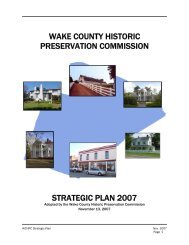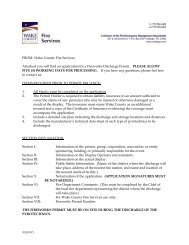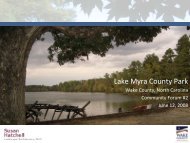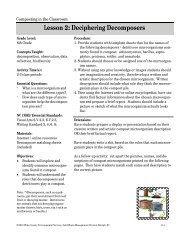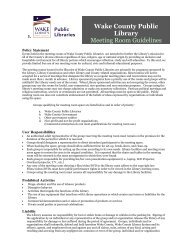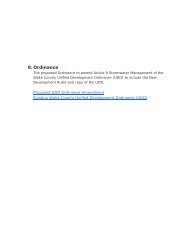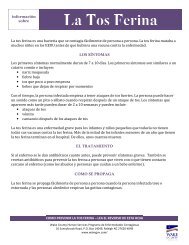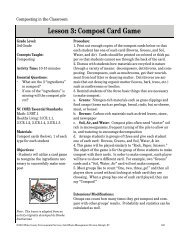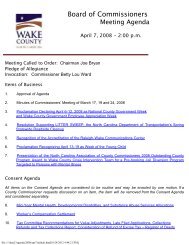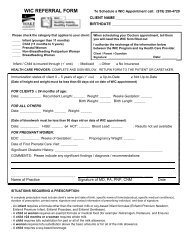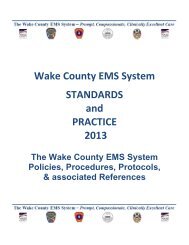Application for Medicaid - NC DHHS Online Publications - Home ...
Application for Medicaid - NC DHHS Online Publications - Home ...
Application for Medicaid - NC DHHS Online Publications - Home ...
Create successful ePaper yourself
Turn your PDF publications into a flip-book with our unique Google optimized e-Paper software.
If You Request A Hearing<br />
If you do not agree with a decision we make about your case, you can request a hearing. You can<br />
request this in person, by telephone or in writing. You must ask <strong>for</strong> this hearing within sixty days of when<br />
we tell you in writing of our decision on your application. You have the right to examine your case record<br />
and documents used be<strong>for</strong>e your hearing.<br />
You can have a household member or someone you ask to represent you, like a friend or relative. You<br />
also have the right to have an attorney or other legal representative represent you at the hearing. Free<br />
legal aid may be available. Call 1-866-219-5262 <strong>for</strong> more in<strong>for</strong>mation.<br />
Citizenship, Identity and Immigration Status<br />
I understand that the county DSS worker will verify citizenship, identity, and immigration status to<br />
determine which <strong>Medicaid</strong> program the applicant may qualify <strong>for</strong>. Household members listed on the<br />
application, but are not applying <strong>for</strong> <strong>Medicaid</strong>, will not be subject to this verification. In order to receive<br />
services, the applicant’s identity must be confirmed. In order to receive regular <strong>Medicaid</strong>, the applicant<br />
must be a citizen or have a qualified alien status. If citizenship or immigration status makes the applicant<br />
not eligible <strong>for</strong> regular <strong>Medicaid</strong>, the applicant can apply <strong>for</strong> Emergency <strong>Medicaid</strong> services.<br />
If the county DSS worker is unable to verify citizenship, identity, and/or immigration status, the applicant<br />
may need to provide additional documentation. If the alien applicant has no documents to establish<br />
qualified alien status, contact a county DSS worker <strong>for</strong> assistance. If not eligible <strong>for</strong> regular <strong>Medicaid</strong>, I<br />
understand that persons applying <strong>for</strong> Emergency <strong>Medicaid</strong> services only are not required to declare or<br />
provide documentation of their immigration status or Social Security Number. These individuals must<br />
meet all other <strong>Medicaid</strong> eligibility requirements, and qualify <strong>for</strong> one of the <strong>Medicaid</strong> coverage groups.<br />
Residence<br />
I hereby certify under penalty of perjury that I and all the persons <strong>for</strong> whom I am making an application<br />
are living in North Carolina with the intention of remaining permanently or <strong>for</strong> an indefinite period, in the<br />
state seeking employment, or have a job commitment.<br />
To verify North Carolina residency, provide two different documents from the following list:<br />
♦<br />
♦<br />
♦<br />
♦<br />
♦<br />
♦<br />
♦<br />
♦<br />
♦<br />
♦<br />
A valid North Carolina driver license or other identification card issued by the North Carolina Division<br />
of Motor Vehicles.<br />
A current North Carolina rent, lease, mortgage payment receipt, or current utility bill in the name of the<br />
applicant or the applicant’s legal spouse, showing a North Carolina address.<br />
A current North Carolina motor vehicle registration in the applicant’s name and showing the applicant’s<br />
current North Carolina address.<br />
A document verifying that the applicant is employed in North Carolina.<br />
One or more documents proving that the applicant’s home in the applicant’s prior state of residence<br />
has ended, such as closing of a bank account, termination of employment, or sale of a home.<br />
The tax records of the applicant or the applicant’s legal spouse, showing a current North Carolina<br />
address.<br />
A document showing that the applicant has registered with a public or private employment service in<br />
North Carolina.<br />
A document showing that the applicant has enrolled his children in a public or private school or a child<br />
care facility located in North Carolina.<br />
A document showing that the applicant is receiving public assistance (such as Food Stamps) or other<br />
services which require proof of residence in North Carolina. Work First and Energy Assistance do not<br />
currently require proof of <strong>NC</strong> residency.<br />
Records from a health department or other health care provider located in North Carolina which shows<br />
the applicant’s current North Carolina address.<br />
DMA-5000 Page 5 of 16<br />
Rev. 08/12



